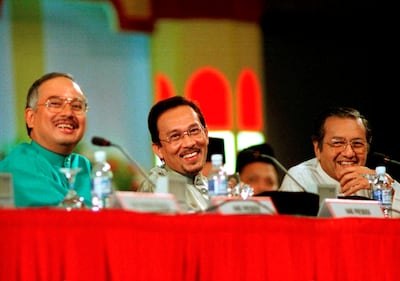It has been a very long walk to power for Malaysian Prime Minister Anwar Ibrahim. He was first tipped as a future leader as far back as 1983, when he became Minister for Culture, Youth and Sports under his mentor, then premier Dr Mahathir Mohamad. His route to the top, as Dr Mahathir’s chosen successor, looked assured until the two fell out in 1998. Mr Anwar was dismissed and subsequently jailed.
Nearly two decades later, in 2018, Mr Anwar was even more explicitly anointed as Dr Mahathir’s successor, as the two old frenemies united to lead the opposition Pakatan Harapan to defeat the hitherto impregnable Barisan Nasional government in the general election. Once Mr Anwar was pardoned from a second jail sentence (the first had eventually been quashed), he was supposed to take over. But Dr Mahathir had tricked him. He never intended to hand over to Mr Anwar, and the government imploded due to internal machinations.
Last November, Mr Anwar finally got to claim the prize. After emerging with the largest number of seats in the general election, his Pakatan coalition formed a unity government with its erstwhile opponents, Barisan, and parties from Malaysia’s Borneo states. A little more than 100 days into his administration, how fares Mr Anwar – a man whom some claimed to be a human rights champion for his imprisonment and calls for reform, while others warned he was a chameleon who would soothe a western audience with liberal pieties, but had a not-so-secret Islamist agenda at home?
The report card reads: cautious, but credible, progress so far. In December, Mr Anwar’s government set a good example by announcing that all cabinet ministers would take a 20 per cent pay cut until the economy recovered, while Mr Anwar had already said he would not take any salary as prime minister or finance minister himself at all.

In January, they demonstrated concern for those struggling with the cost of living crisis by launching the “Menu Rahmah”, basic but nutritious dishes of chicken or fish, rice and vegetables for only 5 ringgit ($1), and available at 15,000 restaurants across the country.
In February, the cabinet agreed to amend the country’s constitution so that children born overseas to Malaysian women and foreign fathers would have the right to citizenship. Previously only Malaysian men could automatically pass on their nationality in those circumstances. Reformers, such as Law Minister Azalina Othman, had been calling for this to be changed for years.
And right from the start, Mr Anwar had set out a new relationship between peninsular Malaysia and the Borneo states of Sabah and Sarawak, which had long felt under-represented, by appointing a second deputy prime minister, Fadillah Yusof, from the island. This, along with the pragmatic alliance with Barisan (whose head, Zahid Hamidi, became the other deputy prime minister), set the foundations for a stability that most hope for. That includes the country’s king, Sultan Abdullah of Pahang, who recently told parliament that after having four prime ministers in four years, he hoped that Mr Anwar would be “the last for me” before his term as Malaysia’s rotational monarch comes to an end next year.
US President Joe Biden sent a warm letter of congratulations in January, yet the international reaction to Mr Anwar taking the top job has been rather muted, considering the status as an “icon of democracy” he once had among friends such as former US vice president Al Gore. This may be partly because the jubilation that greeted Pakatan’s victory in 2018 quickly turned to disappointment, when it became obvious – as some of us had warned – that, at the helm once more, Dr Mahathir remained the Malay chauvinist he had always been, with no commitment whatsoever to the “reformasi” agenda of Mr Anwar and his allies.
Second, the new prime minister’s Pakatan coalition did not win an outright majority. Forming a unity government was the responsible move, after the political upheavals of the past few years, but sitting alongside formerly bitter enemies from Barisan, who had governed continuously from 1957-2018, made compromises inevitable. The illusion of ideological purity that once had western admirers put Mr Anwar on a pedestal was no longer sustainable.

Further, Mr Anwar had led Malaysia’s opposition for more than two decades. Perhaps he could never have maintained that position without some criticisms tarnishing the shine. Quite apart from the suspicions of Islamist tendencies, some asked if he felt too entitled to the premiership. Wasn’t the recent appointment of his daughter Nurul Izzah as his senior adviser (later rescinded) an example of nepotism? As Nurul Izzah, until recently an MP, has often been mentioned as a future prime minister herself, she was certainly qualified to advise her father; but it still struck many as bad optics.
Quite a few have questioned Mr Anwar’s vote-winning capabilities. Pakatan only won in 2018, they say, with Dr Mahathir in charge, and with his own Malay-based party Bersatu, in the coalition. That may be true, but the sole occasion when Pakatan has ever won more than 50 per cent of the vote was in the 2013 general election with Mr Anwar leading the then opposition. Sadly for him, his popular majority did not translate into enough seats to claim the premiership.
New elections are on the horizon this year, in six of the federation’s 13 states. Much is at stake, for the national coalition will be facing the Perikatan Nasional coalition that is dominated by PAS, an openly and unabashedly Islamist party. Never mind segregating genders, PAS actually banned cinemas altogether in one state it has governed for decades.
Mr Anwar will need all his fabled charisma to take the fight to opponents who will exploit the slightest slip to claim that his Malay-dominated but multiracial coalition is undermining the position of the country's Malay-Muslim majority. In a recent interview with Bloomberg TV, however, he appeared lacklustre, and gave short and unpersuasive answers. Even those who have been sceptical about him in the past must hope we see a bit more of the old Anwar, one equally capable of charming an audience into the palm of his hand and rousing the passions of a crowd. Because all the moderates are in his government. Malaysia needs it not just to survive, but thrive.


